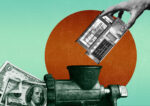Measure ULA, better known as L.A.s mansion tax, was supposed to generate up to $1.1 billion a year for the city. In 18 months, it has brought in less than half that amount, mostly from West L.A.
The voter-approved real estate transfer tax launched in April last year has involved 670 sales that raked in $439 million as of Oct. 31, the Los Angeles Times reported, citing a ULA Revenue Dashboard.
Measure ULA charges a 4 percent fee on all residential and commercial property sales above $5.1 million and a 5.5 percent fee on sales above $10.3 million.
Original projections had promised between $600 million to $1.1 billion a year. The actual take was between 27 percent and 60 percent short of expectations.
Some 57 percent of the properties affected by the tax were mansions, with 20 percent involving commercial properties and 10 percent multifamily complexes.
In terms of geography, Westside neighborhoods accounted for nearly half of all mansion tax sales, according to the Times.
L.A.’s 5th City Council District, which includes Bel-Air and Beverly Crest, reported 138 sales, raising $83.3 million.
District 11, which includes Brentwood, Pacific Palisades and Marina del Rey, had 174 sales, raising $73.9 million.
District 4, which includes the Hollywood Hills and San Fernando Valley neighborhoods such as Encino and Sherman Oaks, accounted for 127 sales, raising $59.4 million.
“The reality is, it’s a lot of money,” Greg Good, director of strategic engagement and policy for the L.A. Housing Department, told the Times. “People made the choice to approve this measure, so it’s important to daylight the impacts.
“That way, we see how things are working and evolve the program to ensure we achieve the goals of ULA.”
The Housing Department also released figures on the ULA Emergency Renters Assistance Program, which funnels money to low-income renters at risk of homelessness. The program has received 31,380 applications, while paying $30.4 million to 4,302 households, according to its new dashboard.
A challenge by real estate interests to Measure ULA was set to be considered this fall by the U.S. Court of Appeals for the Ninth Circuit.
— Dana Bartholomew
Read more



